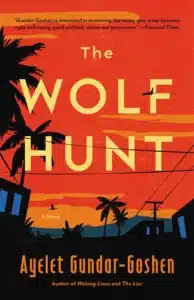When Your Child Becomes a Stranger
October 24, 2023 in Library Corner
By Robin Jacobson.
There’s an old Jewish story about two women sitting on a park bench together. One sighs. Her friend reproves her, “I thought we agreed not to talk about the children!”
The tsores and worries of parents are the subject of two thought-provoking new novels by celebrated Israeli authors. How to Love Your Daughter, by Hila Blum, won the prestigious Israel Sapir Prize, and The Wolf Hunt, by Ayelet Gundar-Goshen, follows the author’s previous bestselling psychological thrillers, Waking Lions and The Liar.
How to Love Your Daughter
 When the novel opens, an Israeli woman named Yoella is furtively peering through the windows of her daughter Leah’s house in the Netherlands, trying to get a glimpse of the two young granddaughters she has never met. Leah left home at age 18, shutting Yoella out of her life. The book unfolds like a mystery to reveal how this sad situation came about.
When the novel opens, an Israeli woman named Yoella is furtively peering through the windows of her daughter Leah’s house in the Netherlands, trying to get a glimpse of the two young granddaughters she has never met. Leah left home at age 18, shutting Yoella out of her life. The book unfolds like a mystery to reveal how this sad situation came about.
As Yoella reflects on Leah’s childhood, she paints a picture of a child who was adored from birth by both her parents. Yoella and her late husband encouraged Leah, spent time with her, and enjoyed a wonderful rapport. The reader begins to suspect that if there were parental mistakes, they were made out of love. Yoella hints as much, musing that she’d like to see more movies focused on quiet domestic dramas, about “mistakes that are so easily made and yet somehow beyond forgiveness.”
In interviews, the author has said that when she began working on the novel, she was a young mother “struck by the multitude of daily decisions that parenting demands, and by the impossibility of predicting their long-term effect.” She worried that even a decision motivated by love and good intentions, might still lead to “miserable outcomes.” Her anxieties fueled the plot of How to Love Your Daughter.
There is a Yiddish saying, “For your children’s sake, you would tear the world apart.” Readers come away from Blum’s book wondering whether it might be wise to temper that impulse.
The Wolf Hunt
 Lilach and Mikhael Shuster are Israeli émigrés living with their sixteen-year-old son, Adam, in a beautiful home in California’s Silicon Valley. Mikhael is a technology company executive, and Lilach coordinates cultural events at a retirement home. This is far from the academic career she once pursued in Israel, but Lilach is content, pleased to be raising her son in a country that is not perpetually at war.
Lilach and Mikhael Shuster are Israeli émigrés living with their sixteen-year-old son, Adam, in a beautiful home in California’s Silicon Valley. Mikhael is a technology company executive, and Lilach coordinates cultural events at a retirement home. This is far from the academic career she once pursued in Israel, but Lilach is content, pleased to be raising her son in a country that is not perpetually at war.
Lilach’s sense of peace within her California suburb is brutally shattered when a local synagogue is terrorized by a machete-wielding assailant. She encourages her shy son to enroll in a self-defense class taught by a charismatic Israeli named Uri Ziv, who is rumored to be an ex-Mossad agent. As the class progresses, Lilach becomes concerned that Uri is encouraging Adam and the other teenagers, who idolize him, to be aggressively militant. Uri drills into his young acolytes the Talmudic proverb, “If someone comes to kill you, rise up and kill him first.”
Soon, Adam is suspected of drugging a classmate who had been bullying him. The boy dies from the overdose. He was Black and a member of the Nation of Islam, which may (or may not) be responsible for the anti-Semitic graffiti that appears on the school wall and the rock thrown into the Shusters’ home.
Lilach, who thought she knew everything about her son, had no idea that he was being bullied. And now, although she would never openly admit to any doubt about Adam’s innocence, she secretly wonders whether her beloved son might just possibly be a murderer.